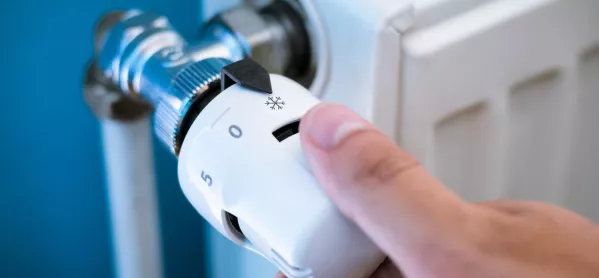Heads’ budget warning over soaring winter energy bills

Headteachers have warned that school budgets could be “crippled” this winter by soaring energy costs and the need to keep buildings heated with windows open as a Covid safety measure.
The NAHT school leaders’ union has highlighted the issue in response to new analysis from the Labour Party, published tonight, which claims that school energy bills could increase by around £80m.
The union’s general secretary Paul Whiteman said it was already hearing from schools where bills “dramatically increased, even when they thought they were locked into a fixed tariff”.
Disruption: Heads urged to report petrol problems to DfE
Advice: Open windows to flush out Covid
Covid: Outdoor lessons idea ‘a total fudge’, DfE told
He said: “With energy costs skyrocketing, the government does urgently need to look at how schools might be impacted this winter.”
Mr Whiteman added that Covid guidelines still call on schools to keep windows open for ventilation, but classrooms will need to be heated to a reasonable temperature for the children in them.
“Heating use - and bills - could rapidly start to cripple already pressured school budgets.”
The new Labour Party analysis today shows that state schools pay more than £660 million in energy costs every year.
With electric and gas costs rising, the party said the average energy bill is likely to rise by 12 per cent in the coming months. In schools, that could bring total outlay up to almost £740 million.
Labour also said that secondary schools are likely to be hit particularly badly by the rise. It added: “Back in 2016-17, secondary schools spent around £90,000 per year on energy. Even if their bills had remained static since then, this year’s rise will add over £10,000 to each school’s energy bill.”
And it warned that schools in the North East would be hit particularly hard, with some schools in Northumberland being warned of a 48 per cent rise in gas prices, alongside a 26 per cent increase in electricity bills
Peter Kyle, Labour’s shadow schools minister, said: “With little government support for catch-up, they’re operating on a shoestring, and just like families everywhere are working desperately to make ends meet.
“What they don’t need is a £10,000 bill whacked on their desks for gas and electric, forcing schools to choose between spending on teaching, and keeping the lights on.”
Geoff Barton, general secretary of the Association of School and College Leaders, said: “Labour has identified a huge extra cost pressure on school budgets which are already extremely tight.”
Mr Barton added that these energy increases weren’t the only extra costs coming down the line, citing the potential need for schools to meet the costs of raising teacher starting salaries to £30,000.
“We absolutely do think that salaries need to be improved across the board to boost recruitment and retention. And we fully welcome the additional investment in schools.
“The trouble is that school budgets have been hammered over the past decade and this extra money could very quickly evaporate under the weight of extra costs.
“Wednesday’s Budget is not a case of job done.”
A Department for Education spokesman said: “Core funding for schools will rise by £4.7 billion by 2024-25 compared to existing plans - building on the largest cash boost for a decade provided at the Spending Review in 2019.
“Overall, this is equivalent to a cash increase of £1,500 per pupil by 2024-25 compared to 2019-20.
“Schools experiencing financial issues can access a range of schools resource management tools, and, in serious circumstances additional funding or advances from local authorities or the ESFA.
“We have started to provide CO2 monitors to state-funded education settings, including early years, schools and further education providers, supporting staff to balance good ventilation with keeping classrooms at a comfortable temperature.”
You need a Tes subscription to read this article
Subscribe now to read this article and get other subscriber-only content:
- Unlimited access to all Tes magazine content
- Exclusive subscriber-only stories
- Award-winning email newsletters
Already a subscriber? Log in
You need a subscription to read this article
Subscribe now to read this article and get other subscriber-only content, including:
- Unlimited access to all Tes magazine content
- Exclusive subscriber-only stories
- Award-winning email newsletters
topics in this article



